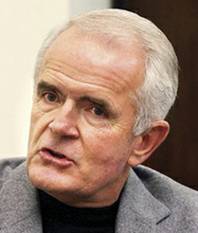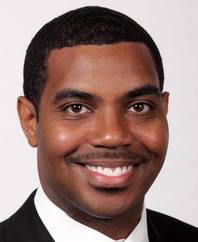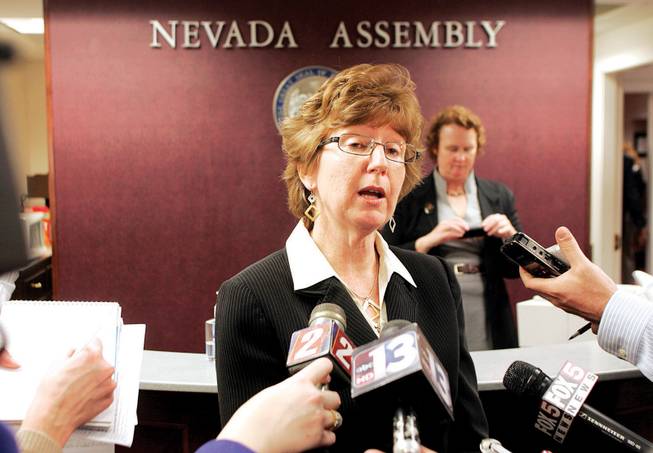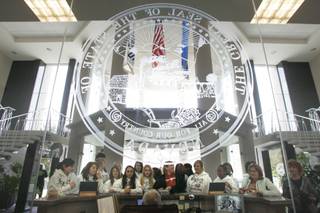Sunday, Feb. 28, 2010 | 2 a.m.
Sun archives
- State legislative leaders, governor reach budget deal (2-27-10)
- Please, sir, may we tax you more? (2-27-10)
- Lawmakers say progress made in closing state budget shortfall (2-26-10)
- Bipartisanship emerges in anger at Gibbons over session deadline (2-25-10)
- Democrats: Trim education cuts to 5 percent (2-24-10)
- Gibbons adds to agenda, says session will end by Sunday night (2-24-10)
- Relationship between Gibbons, Raggio shows strain on Day 2 (2-24-10)
- Plan to use cameras to catch uninsured motorists appears dead (2-24-10)
- Gibbons’ budget plan risky in an election year (2-24-10)
- Anti-tax ideology tests Republicans (2-24-10)
- Gibbons pulls senior staff from legislative hearings (2-23-10)
- Gibbons denies, then admits taking texting friend to D.C. (2-23-10)
- Lawmakers to tackle water rights during special session (2-23-10)
- Proposal to close state prison meets opposition (2-23-10)
- Budget crunchtime: Lawmakers set to tackle historic deficit (2-23-10)
As legislators and the governor negotiate a deal to balance the state’s battered budget, they are playing to two very distinct audiences: their fellow insiders in Carson City, who represent the state’s powerful interests and fund their campaigns, and the voting public, who will render the ultimate judgment on the job they’ve done here.
To understand this inside/outside game, consider the move early last week by Assembly Republicans, who trumpeted a plan to balance the budget without tax increases and minimal fee hikes. They had the media’s rapt attention as they claimed, rightly, to be the first to step forward with a complete proposal during the special session that began Tuesday.
The message — they weren’t just the caucus of “no,” but had a legitimate plan — likely played well with its intended audience, voters outside Carson City.
Inside the Legislature, however, among their colleagues and the lobbying corps, the proposal was a debacle.
Assembly Republicans later admitted to stealing much of it from their Democratic colleagues and, as a result, couldn’t explain key pieces of the plan. Because of that theft, Sen. Bill Raggio, R-Reno, whose support is key to closing deals, was privately furious with Assembly Minority Leader Heidi Gansert and her caucus.
While that might hurt them on the inside, those who were surprised and angered by the Assembly Republicans’ move also acknowledged it looked like a smart move to people on the outside.
It was a prime example of the two games at work in the capital, often referred to as the inside-outside dynamic. Both arenas affect what gets done in state government.
Personal relationships matter when it comes to negotiating deals that get legislation passed. Play the inside game poorly and campaign contributions from unions or big businesses dry up.
Play the outside game poorly and votes dry up.
The savviest players come to Carson City with an eye on both games. Here’s how some of the key players are playing the inside/outside game this special session:
Gov. Jim Gibbons

Gov. Jim Gibbons
For all of the governor’s public missteps, his failure at playing the inside game over the past three years has possibly taken the largest toll on his political stature. That has been evident in the measly $165,000 in campaign money he raised in 2009, an amount so low as to be debilitating.
But during this session, Gibbons has emerged from his three-year hibernation — at least when it comes to the legislative process — to play an active role. Over the past five days, Gibbons has attended more meetings in the Legislative Building than he did in the previous 120-day regular session.
His spokesman noted Friday that it was the first time he had seen the governor sit through a 90-minute meeting, a sign, he said, of how serious Gibbons takes the negotiations.
This strategy has given Gibbons, who insists he’s seeking re-election despite low poll numbers, a victory at both the inside and outside games.
He appears engaged and relevant, a chief executive moving the ball forward. To drive that point home, he made a rare television appearance Friday, speaking with Sun columnist Jon Ralston on his “Face to Face” program about the budget talks.
On the inside, Gibbons has won as well. The threat of his veto pen has always made him relevant to the process, but now he’s in the room weighing in with legislative leadership.
Senate Majority Leader Steven Horsford

Steven Horsford
Horsford has staked his political future — and that of the Democratic caucus — on a high-profile fight with the state’s largest business interests.
On Friday, Horsford singled out gaming, calling on the industry to pay $32 million a year in additional fees to cover the cost of the state agencies that regulate casinos.
But he didn’t stop there. Horsford called on mining, banking, insurance, trucking and retail to pay their “fair share,” with senators of both parties chiding industry lobbyists for refusing to shoulder more taxes to help solve the budget crisis.
This strategy — an outside play — will likely affect November’s election.
His stance has angered lobbyists and business interests. And it’s no secret that many of these companies are key donors to political campaigns. Some lobbyists said it will be harder for Horsford to raise money to help maintain or expand the Democrats’ majority in the state Senate.
But Horsford’s gamble is that his approach will play well with voters, even if it offends insiders.
Horsford told reporters that he simply doesn’t believe gaming’s argument that it can’t afford the fee increases because of the losses it has suffered in the recession.
“Look, $30 million is three $10 million high rollers,” he said, putting it populist terms. “To the average person who is really struggling to make basic decisions about how to keep their families together, the idea that the entire gaming industry can’t pay” rings hollow.
It has been nearly a decade since a legislator had so boldly challenged gaming, the state’s most powerful industry.
Whether it actually results in the fee increases he sought — Gibbons vowed to veto any increases the industry doesn’t agree to — it allows Horsford to make the case to the public that Democrats targeted powerful interests to protect essential government services.
Of course, Horsford’s public gambit will work only if he can keep or increase his majority in November.
Assembly Speaker Barbara Buckley

Barbara Buckley
Buckley and other Democrats were seething after Assembly Republicans took the confidential spreadsheet of their budget plan, made some adjustments and called it their own.
At an impromptu news conference, Gansert, flanked by other Assembly Republicans, had held up the plan and called it a “common sense” compromise.
In response, Buckley called the Assembly to order and her caucus began to pick apart the Republican plan, using their leverage to win the inside game. For all to see, they asked about certain aspects that Republicans couldn’t explain.
Gansert was forced to apologize for releasing the confidential plan.
As the Assembly adjourned and lawmakers left the floor, the media sought Buckley’s response. Would she lambaste her colleagues before the media for violating the unwritten rules of the Legislative Building? Or would she use the incident to spin it as progress toward a bipartisan agreement on the budget?
Democrats met behind closed doors for 10 minutes. When Buckley emerged from her office, she was calm and smiled to the television cameras. Sure, she said, it was unfortunate that Republicans had released portions of the plan not yet ready for public consumption. But, she said, “I think it’s great we’re making progress.”
The inside game was over for now. Playing the outside game, she told the voters their elected representatives were hard at work resolving the state’s problems.



Join the Discussion:
Check this out for a full explanation of our conversion to the LiveFyre commenting system and instructions on how to sign up for an account.
Full comments policy